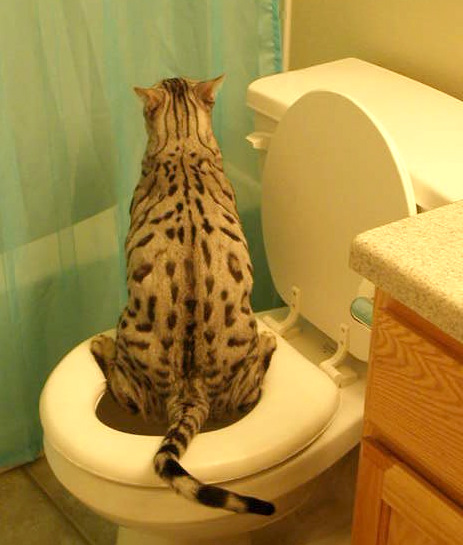Reasons Flushing Cat Poop Down Your Toilet Isn't a Good Idea - Advice for Proper Disposal
Reasons Flushing Cat Poop Down Your Toilet Isn't a Good Idea - Advice for Proper Disposal
Blog Article
This article following next in relation to Can You Flush Cat Poop Down The Toilet? is rather captivating. Check it out yourself and figure out what you think of it.

Introduction
As cat proprietors, it's essential to bear in mind how we get rid of our feline pals' waste. While it might appear hassle-free to flush feline poop down the bathroom, this technique can have harmful effects for both the environment and human wellness.
Alternatives to Flushing
The good news is, there are much safer and much more accountable ways to throw away cat poop. Take into consideration the complying with options:
1. Scoop and Dispose in Trash
One of the most typical technique of taking care of feline poop is to scoop it into a biodegradable bag and throw it in the trash. Be sure to use a committed trash inside story and throw away the waste immediately.
2. Usage Biodegradable Litter
Select naturally degradable feline trash made from products such as corn or wheat. These litters are environmentally friendly and can be securely thrown away in the trash.
3. Bury in the Yard
If you have a yard, think about burying cat waste in a designated location away from vegetable yards and water resources. Be sure to dig deep enough to avoid contamination of groundwater.
4. Install a Pet Waste Disposal System
Invest in an animal garbage disposal system particularly developed for pet cat waste. These systems use enzymes to break down the waste, lowering odor and ecological impact.
Health and wellness Risks
Along with environmental worries, purging cat waste can likewise posture wellness risks to people. Cat feces might contain Toxoplasma gondii, a parasite that can trigger toxoplasmosis-- a possibly extreme illness, particularly for pregnant women and individuals with weakened immune systems.
Environmental Impact
Flushing cat poop presents hazardous microorganisms and parasites into the supply of water, positioning a significant threat to marine ecological communities. These pollutants can negatively influence aquatic life and compromise water top quality.
Conclusion
Accountable animal possession prolongs beyond giving food and sanctuary-- it also involves appropriate waste monitoring. By refraining from purging pet cat poop down the commode and selecting alternative disposal methods, we can minimize our environmental impact and shield human wellness.
Why You Should Never Flush Cat Poop Down the Toilet
A rose by any other name might smell as sweet, but not all poop is created equal. Toilets, and our sewage systems, are designed for human excrement, not animal waste. It might seem like it couldn’t hurt to toss cat feces into the loo, but it’s not a good idea to flush cat poop in the toilet.
First and foremost, assuming your cat uses a litter box, any waste is going to have litter on it. And even the smallest amount of litter can wreak havoc on plumbing.
Over time, small amounts build up, filling up your septic system. Most litter sold today is clumping; it is made from a type of clay that hardens when it gets wet. Ever tried to scrape old clumps from the bottom of a litter box? You know just how cement-hard it can get!
Now imagine just a small clump of that stuck in your pipes. A simple de-clogger like Drano isn’t going to cut it. And that means it’s going to cost you big time to fix it.
Parasitic Contamination
Believe it or not, your healthy kitty may be harboring a nasty parasite. Only cats excrete Toxoplasma in their feces. Yet it rarely causes serious health issues in the cats that are infected. Most people will be fine too if infected. Only pregnant women and people with compromised immune systems are at risk. (If you’ve ever heard how women who are expecting are excused from litter cleaning duty, Toxoplasma is why.)
But other animals may have a problem if infected with the parasite. And human water treatment systems aren’t designed to handle it. As a result, the systems don’t remove the parasite before discharging wastewater into local waterways. Fish, shellfish, and other marine life — otters in particular — are susceptible to toxoplasma. If exposed, most will end up with brain damage and many will die.
Depending on the species of fish, they may end up on someone’s fish hook and, ultimately on someone’s dinner plate. If that someone has a chronic illness, they’re at risk.
Skip the Toilet Training
We know there are folks out there who like to toilet train their cats. And we give them props, it takes a lot of work. But thanks to the toxoplasma, it’s not a good idea.

We hope you enjoyed reading our excerpt about How to Dispose of Cat Poop and Litter Without Plastic Bags. Thank you so much for finding the time to browse our article post. Please take the time to share this page if you enjoyed reading it. Thanks a bunch for your time. Please visit our site back soon.
This Site Report this page